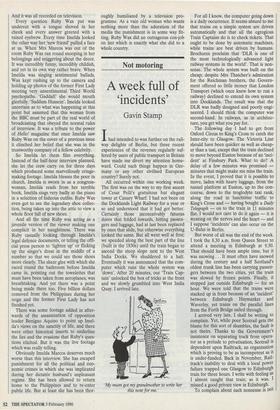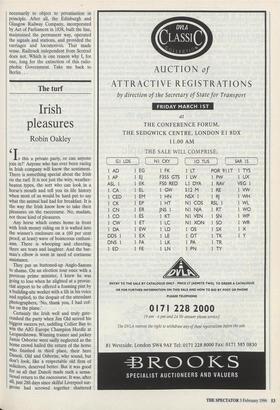Not motoring
A week full of `incidents'
Gavin Stamp
Ihad intended to wax further on the rail- way delights of Berlin, but three recent experiences of the reverses regularly suf- fered by users of public transport in Britain have made me divert my attention home- ward. Could such things happen in Ger- many or any other civilised European country? Surely not.
All occurred within one working week. The first was on the way to my first ascent of Cesar Pelli's gratuitous but elegant tower at Canary Wharf. I had not been on the Docklands Light Railway for a year or so and understood that it had got better. Certainly those inconceivably fatuous doors that folded inwards, hitting passen- gers and luggage, had at last been replaced by ones that slide, but otherwise everything looked the same. But all went well at first; we speeded along the best part of the line (built in the 1830s) until the train began to ascend the steep slope next to the West India Docks. We shuddered to a halt. Eventually it was announced that the com- puter which runs the whole system was `down'. After 20 minutes, our 'Train Cap- tain' unlocked the box of tricks at the front and we slowly grumbled into West India Quay. I arrived late.
`My mum got my grandmother to write her this note for me.' For all I know, the computer going down is a daily occurrence. It seems absurd to me that trains on a simple system are driven automatically and that all the egregious Train Captains do is to check tickets. That ought to be done by automatic machines, while trains are best driven by humans. Brochures proclaim that `DLR is one of the most technologically advanced light railway systems in the world'. That is non- sense. The whole system was built on the cheap; despite Mrs Thatcher's admiration for the Reichman brothers, the Govern- ment offered so little money that London Transport (which once knew how to run a railway) declined to extend its own system into Docklands. The result was that the DLR was badly designed and poorly engi- neered. I should think the computer was second-hand. In railways, as in architec- ture, you get what you pay for.
The following day I had to get from Oxford Circus to King's Cross to catch the Inter-city to Glasgow. The Victoria Line should have been quicker as well as cheap- er than a taxi, except that the train declined to move beyond Euston because of an 'inci- dent' at Finsbury Park. What to do? A delay of a few minutes was promised minutes that might make me miss the train. In the event, I proved that it is possible to move, laden with heavy luggage, from the tunnel platform at Euston, up to the con- course, down to the troglodyte taxi rank, along the road in lunchtime traffic to King's Cross and — having bought a Daily Telegraph — on to the train in 11 minutes flat. I would not care to do it again — it is wearing on the nerves and the heart — and I suppose 'incidents' can also occur on the U-Bahn in Berlin.
But worst of all was the end of the week. I took the 8.30 a.m. from Queen Street to attend a meeting in Edinburgh at 9.30. That should have been ample time, but it was snowing ... It must often have snowed during the century and a half Scotland's oldest trunk line has been carrying passen- gers between the two cities, yet the train was slowed by frozen points. Finally, it stopped just outside Edinburgh — for an hour. We were told that the trains were stacked up in front because of an 'incident' between Edinburgh Haymarket and Waverley, yet trains on the parallel lines from the Forth Bridge sailed through.
I arrived very late. I shall be writing to complain. Yet, while poor Scotrail gets the blame for this sort of shambles, the fault is not theirs. Thanks to the Government's insistence on separating track from opera- tor as a prelude to privatisation, Scotrail is dependent upon Railtrack, an organisation which is proving to be as incompetent as it is under-funded. Back in November, Rail- track's inability to deal with a local power failure trapped one Glasgow to Edinburgh train for three hours. I write with feeling as I almost caught that train; as it was, I missed a good private view in Edinburgh.
To complain about such nonsense is not necessarily to object to privatisation in principle. After all, the Edinburgh and Glasgow Railway Company, incorporated by Act of Parliament in 1838, built the line, maintained the permanent way, operated the signals and stations, and provided the carriages and locomotives. That made sense. Railtrack independent from Scotrail does not. Which is one reason why I, for one, long for the extinction of this railo- phobic Government. Take me back to Berlin ...



































































 Previous page
Previous page